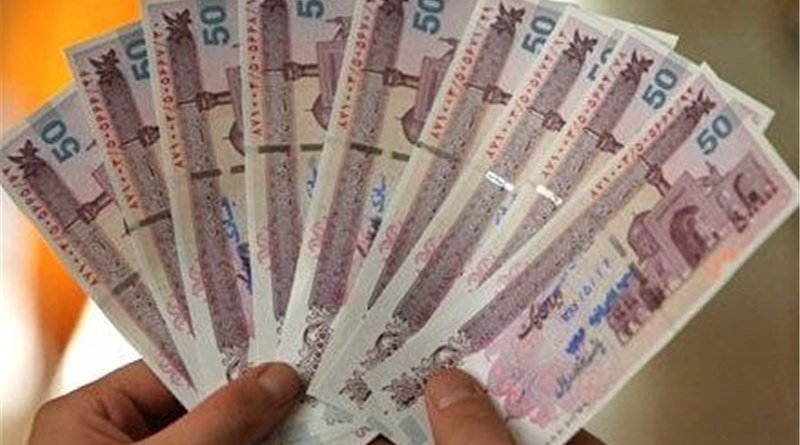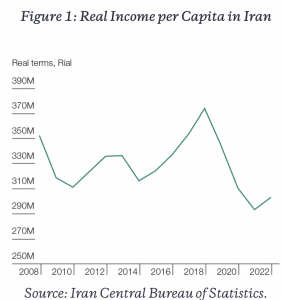How To Counter Tehran’s Economic Strategy – Analysis
By Yair Albeck*
Tehran is stringing out the nuclear negotiations endlessly with the expectation that President Joe Biden will not admit that the talks have failed. After such an admission, the public would likely pressure the administration to stop offering Iran stealth economic relief through the lax enforcement of sanctions.
Rigorous enforcement would, the White House fears, remove Iranian oil from the market and contribute to the global energy crisis that Russia’s war against Ukraine sparked. Meanwhile, Iran is benefitting doubly—strategically and economically—from the war, selling missiles and drones to Russia and oil to China. Given this advantageous situation, Tehran wants negotiations to continue.
Can the United States escape from this conundrum? In fact, it can impose severe economic costs on Tehran without removing oil from the market.
The Trump Approach
Before we examine that approach, let’s review some of the history. The US withdrawal from the JCPOA and President Donald Trump’s “Maximum Pressure Campaign” led to the second-most severe economic crisis in Iran since the Islamic Revolution in terms of GDP contraction. (The most-severe economic crisis was during the Iran-Iraq War.) Due to sanctions and COVID-19, Iran’s international trade declined dramatically, primarily in the industrial sector. As figure 1 shows, its GDP declined by an average of 4 percent annually until the beginning of 2021, and GDP per capita shrunk even further by 5.5–6 percent. Inflation rose to above 40 percent annually. The real income of the Iranian household regressed to what it was a decade and a half ago.
As a result, in 2019 a wave of protests swept across Iran, with demonstrators from different economic sectors protesting unpaid wages. These protests peaked in November 2019 when the government reduced fuel subsidies, causing special hardship for the poor. From a purely economic point of view, this reform was the right step. But it was politically costly, and previous governments had therefore failed to implement it. That President Hassan Rouhani bit the bullet speaks to the depth of the financial stress the regime was experiencing.
Tehran tried to use every lever at its disposal to relieve the economic pressure. For example, it attempted to break the economic siege diplomatically by negotiating with Europe over the creation of a protected trade channel. The American sanctions, however, were too comprehensive for such a channel to become effective. Iran also began violating its nuclear obligations to gain negotiating leverage while adopting an active military approach, launching attacks against vessels in the Persian Gulf and against Aramco facilities in Saudi Arabia. In Iraq, it initiated a violent campaign through its proxies to expel American forces from the country.
The Trump administration answered this campaign in January 2020 by killing Qasem Soleimani, the commander of the elite Quds Force of the Islamic Revolutionary Guards Corps (IRGC). This event largely deterred Iranian leaders, who feared an American strike on Iranian soil. However, after the US presidential elections, Iran changed its policy and accelerated its nuclear violations to accumulate assets before future negotiations.
Biden Repudiates Trump
The Biden administration regards America’s much larger adversaries, Russia and China, as its priority while the conflict with Iran is a secondary concern. It hopes to put the Iranian nuclear program “in a box,” as National Security Advisor Jake Sullivan said. So the White House wanted to return to the Joint Comprehensive Plan of Action (JCPOA) as soon as possible. It weakened sanctions enforcement as a sign of goodwill to Tehran, and it expected that Iran’s leaders would reciprocate with a quick return to the deal. After the Russian invasion of Ukraine, the administration sought to prevent oil prices from going higher by not effectively stopping Iranian oil exports to China. Moreover, the administration thought that an agreement with Iran could immediately increase the supply of oil to the market by an additional one million barrels per day.
But Iran understands the US eagerness to return to the deal all too well. Tehran does not believe that the US will increase pressure on it in the short term, so it prolongs the negotiations and makes more demands. For example, Iranian leaders demanded that the International Atomic Energy Agency close its investigations into violations of the safeguards agreements that Iran signed with the Nuclear Non-Proliferation Treaty. The regime also insisted that the Biden administration remove the IRGC from the US list of foreign terrorist organizations. Neither of these demands has any connection to the JCPOA. In addition, Tehran demanded that the US commit not to withdraw from the agreement in the future—a promise that no administration can impose on its successor.
To be sure, prolonging the negotiations in this way entails economic costs. But the regime has always kept expectations low. It never aspired to economic prosperity and strives instead to provide its citizens only with the minimum standard of living necessary to preserve the regime’s stability.
Moreover, the war in Ukraine, by generating a Russian demand for Iranian weapons and jacking up the price of oil, has improved the regime’s revenue stream and geopolitical position. Leaders in Tehran are proud of their success at circumventing sanctions. They welcome the opportunity to offer their know-how to Russia and other countries, thereby undermining the American-led order. Tehran is exporting weapons not just to Russia but to a handful of other powers, too. It plausibly boasts that some potential state buyers are already queuing up for its drones and missiles. The Islamic Republic, leaders in Tehran delight in observing, cannot be boxed in so easily.
Neither the growing alliance with Russia nor the protests on Iranian streets have changed the Western powers’ attitude with respect to the utility of imposing greater economic sanctions on Iran. While the brutal suppression of protestors has forced the US and some European allies to impose new sanctions, they have taken care to impose them only on individual Iranian officials. These sanctions send a political message without increasing economic pressure on the regime.
The Way Forward
But Iranian protestors express total opposition to the regime—decrying its religious coercion, political oppression, corruption, and failure to improve the standard of living. Unprecedented in their size and duration, the protests have put the regime on the defensive. In fact, Tehran’s recent aggressive behavior, including the drone attack in the Gulf of Oman and the announcement about increasing uranium enrichment, reveals its distress.
The world is witnessing the convulsions of a regime facing its own mortality. The regime’s vulnerability offers the Biden administration an opportunity to gain leverage in the nuclear negotiations.
There is a path forward that can squeeze Iran economically without disrupting the already tight oil market. To that end, the US needs to target foreign entities outside Iran that enable the country to circumvent sanctions, rather than companies inside Iran.
Iranians have dealt with sanctions for many years by developing more and more sophisticated trade channels to circumvent US sanctions. For example, Iran sets up proxy companies and bank accounts in the Middle East’s main financial centers and manages financial transactions through them. So Iranian banks do not transfer money inside or outside Iran but use an electronic clearinghouse to settle currency trades between Iranian exporters and importers.
To revitalize its deterrence, the United States should target the financial institutions that help Tehran and the individuals who work in them. Iran uses American allies such as the United Arab Emirates and Turkey—which the Financial Action Task Force, a global money laundering and terrorism financing watchdog, labels as financial jurisdictions “with strategic deficiencies.” In other words, Iran can easily exploit financial institutions in these countries to evade sanctions due to a lack of regulation and loose standards.
Since June the Biden administration has indeed imposed several rounds of sanctions on companies that facilitate the sale of Iranian petroleum and petrochemical products. Although that is a step in the right direction, in practice such measures only force Iranians to change the names of companies and then go back to business as usual.
The US needs more deterrent actions to achieve a significant impact. Previously, the US sometimes imposed sanctions on foreign financial institutions and banks, such as the Halkbank in Turkey, Al-Bilad Islamic Bank in Iraq, and the Jammal Trust Bank in Lebanon. This kind of enforcement deters other financial institutions and causes them to improve their self-regulation. But the US has not employed such measures systematically or consistently. Of course, the US could impose less harsh measures such as fines, and cooperation with regulators in these countries remains essential to encourage their banks to comply with US sanctions. These actions may prevent the need for stricter measures.
Disrupting Iranian activity in the financial centers will not disrupt the global oil market. While Iran’s revenues from sales will be frozen, Tehran will not take its oil off the market because it fears losing market share. And as it knows from experience, it will have access to its revenues at some future date when it finally reaches an agreement with the United States.
Targeting Iranian activity in financial centers outside Iran will also target Iranian petrochemical and metal exports, sectors that previous sanctions barely hurt. These sectors generate tens of billions of dollars annually for Iran, but their decentralized nature makes them easier to disguise.
The US should strengthen compliance in the Middle East’s main financial centers even if the White House eventually signs a nuclear agreement with Tehran. Some sanctions on Iranian entities like the IRGC will remain. The US will still act against Iranian terrorism, and it will want its terrorist designations to have more than a symbolic meaning. Moreover, other countries, like Russia and Syria, are using the same methods and institutions as Iran, creating an even broader imperative for sanctions enforcement.
Maintaining an effective sanctions regime is like an arms race. As the target country builds new and more sophisticated ways to circumvent sanctions, the enforcing country has to race to block them. Blocking Iran’s main financial nodes is the critical next step to success.
*About the author: Yair Albeck is a Visiting Research Fellow at the Hudson Institute
Source: This article was published by the Hudson Institute


